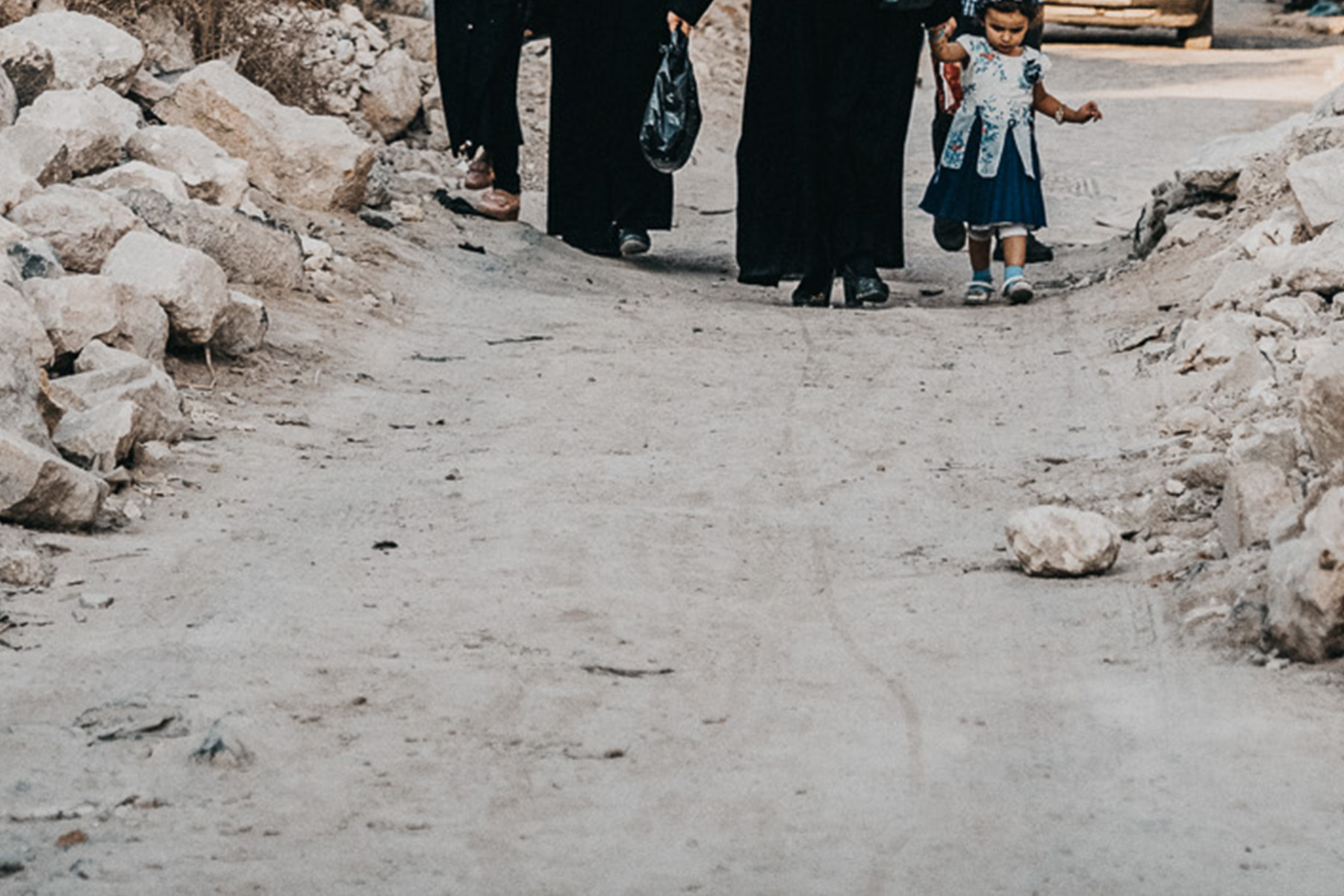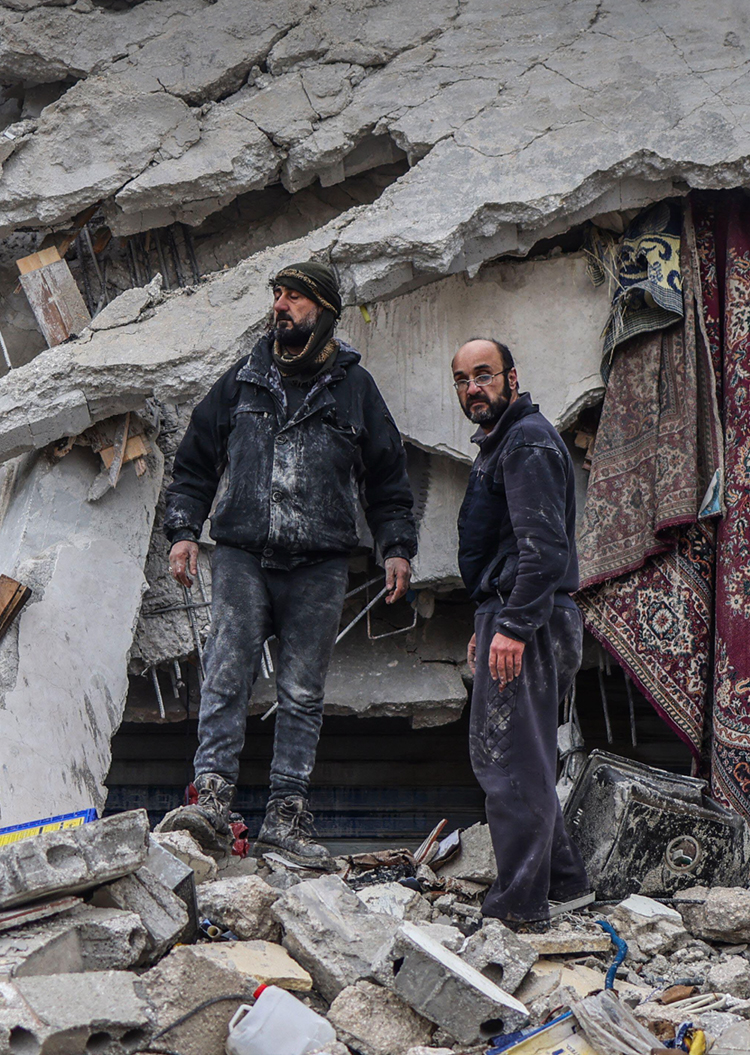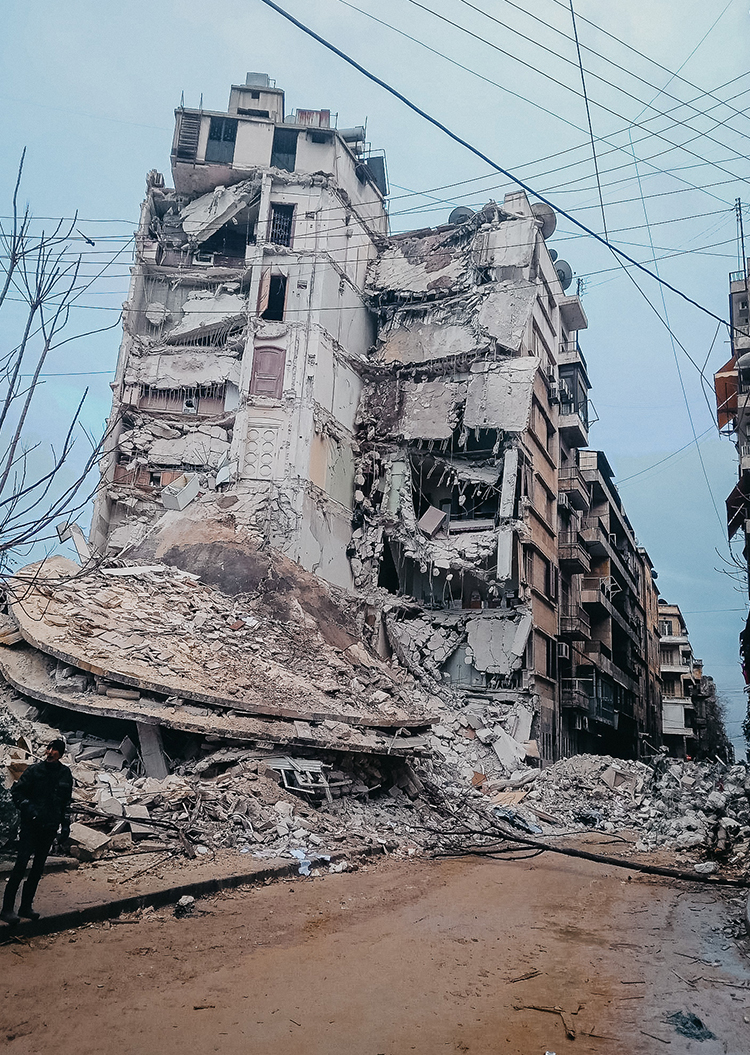We recently interviewed Leyla Samar, an aid worker in Aleppo who works for a local Open Doors partner. This is her first-hand account of what is happening on the ground amongst the devastation.
Listen Now: Leyla chats with Ben McEachen from Hope 103.2 in Sydney.
Can you describe what it was like when you first arrived in Aleppo? What did you see?
When I first arrived in Aleppo, what I saw around me and everywhere was sites of destruction. It was all grey, it was all stones everywhere, rubbles and stones, and dust in my mouth and in my hair and all over my clothes. It’s everywhere. And I could feel that this city has gone through a lot. The old buildings give you the impression that they would fall at any second really. And obviously, it was already unsafe for the residents of Aleppo to be staying. And some of these buildings that have witnessed the war, a decade long of war.
Then I started seeing people on the streets, gathered all over in open spaces. You obviously sense that they think that are safe there and not somewhere else. Up until I reached the centre, which we call the Centre of Hope, and then I saw a crowd of people there gathered. Some sitting, some talking, children playing. And you can feel, “Okay, this is nice community centre.” At least you can feel that people are safe there.
Can you describe the Centres of Hope? What’s happening, and what kind of buildings are the Centres of Hope in?
Centres of Hope that our local partners support are, in a sense, the church or monasteries. And while the physical location is one of a church, it’s also a place where people come to get to meet each other, gather with each other. There’s a hall, usually, next to the church where they gather. And this is also a place where our local partners would do activities for the community.
And in this crisis specifically, the Centres of Hope, or the church, is playing a crucial role in supporting and receiving people who are affected. Since the very first few hours of the crisis, talking to an active member of the local church, the woman said she was the one that, few hours after the earthquake, rushed into the church to open it and start receiving all the people, especially those who were calling her, who are also church members.
So, she immediately took the decision to send out the driver to fetch all these people and bring them to this kind of safe place for them to stay. Safe not only away from the debris or the stones falling off the balconies, but also safe in the sense that it’s a warm place, because it was a cold wintry night, and it was raining cats and dogs according to her. So, she wanted people to come to that place and feel they are safe, they are welcomed, and they are warm.
And that’s how these Centres of Hope turn out to be. It’s a place where people can come, have a meal, that we, as a local organisation, also provide, have a meal, have a place to sit and feel warm, because it’s still warm. Even yesterday and today, I’ve been walking outside, and the temperature can drop as low as five to six degrees. For us Middle Easterners, that’s quite cold. We’re not used to cold weather a lot.
Has it helped having the Centres well established in these communities in being able to respond to what’s just happened?
Frankly speaking, walking around the city for two days, I haven’t seen any other agency doing any help. I’ve seen a banner for the UN and maybe a sign for Caritas. But other than that, I haven’t seen anything else. So, I just realised the importance of what we’re doing through our partners, the Church. They have a leading role in this. You can see pastors, like a beehive, going in and out, answering calls or seeing people in their offices.
Where I’m sleeping currently in the Centre of Hope, last night I slept on the floor, and I can show you the photo of the priest who was sleeping in the room next to me, sleeping on a chair. These people are leading a crisis. They are managing a crisis and they’re, despite everything, smiling. I wake up and this morning, and I saw a pastor offering people to eat and checking on everyone. Who is the Church? This church is the people that are in it. So, people like this pastor or the woman helping others—they are the people who are making the difference nowadays.
And the staff, of course, are local residents. They must be exhausted; are they getting rest? Who is supporting them?
They are mainly exhausted since the beginning because they lost sleep the first two nights. Lost sleep because, up till now, people are so scared to go back home. So, our staff slept in their cars the first night, like many other Syrians in Aleppo.
Last night, I actually walked. I went for a walk next to the Centre of Hope. And then I saw the cars parked on the side. Obviously, that’s the normal thing. Only then to discover that it was packed with people inside them. I took a photo, but it’s too dark and it doesn’t show anything, honestly. But it tells you that people are still feeling unsafe to go back to their buildings. And why would they feel safe? These buildings, not only they are old, but they have suffered years of war. They are already shaken and probably already not safe for them to be living in.
And to talk about the Syria crisis in general, these years of crisis, of war, and then economic crisis and maybe even Covid, and now this. Syrians keep saying, “What is enough?”. And some of them, there’s one or two people I’ve talked to, they said, “Okay. Why, God?”. And maybe some people look at this crisis and try to get the joy and the hope out of it. Others are not as deeply rooted in their faith. And these are the people we need to pray for so that they don’t feel despair; that they stay rooted in their faith and that they regain [faith] in their spirits.
You are now there after three or four days since the first earthquake struck. What does it look like when you walk out onto the street? What’s happening? What do you see?
I see people, civilians, trying to clear the outside of the building, the roads. I see people gathered. Just now, a few minutes ago, as I entered the centre, I saw a gathering of people, and took a few seconds of video of that. And I asked them, why are they gathered? Because I noticed that they have luggage and suitcase. And they said they want to leave Aleppo for a couple of days. It’s too much for them.
Today, I talked to two Syrians, and they told me that they still don’t feel safe going back to their place. Some are hosting others, if they feel that their place is safer than the other peoples, who don’t feel safe going back at home. Others are sleeping at shelters, like the Centres of Hope. Others are trying to defy the danger and still sleep anyway in their place. Some are sleeping in their cars.
But one thing for sure, people need the basics still. They need food, they need heat heaters, they need blankets. And most importantly, they also need somebody to come and assess their places, which is still unclear who is doing it.
You’re in the middle of winter there. Can you give us a feel, long-term, when people are thinking they’re going to do to recover from this? The houses, the homes have been destroyed, the infrastructure is under strain, and the hospitals must be under strain from what’s just happened. How are people going to cope with this in the long term, do you think?
That’s a very interesting question, and it’s hard for me to get really to the bottom of that question, because you talk to people, and somehow, they don’t think about this. Even these repetitive earthquakes that are still happening. During the night, I was awake, already waiting for the media interview, and I felt an earthquake, and it turned out to be three or four degrees, I think, maximum. And I was so scared. But they don’t. There were people still awake in the centre. “Oh, it’s normal. Don’t worry. We got used to it by now.” When did you get used to this already? It’s been only three days, but it tells you a little bit about the resilience of the Syrian people. And for them, I only ask one person this question, they said, “We always do get back on our foot.” But what that really means, I don’t know.
Sounds hopeful, doesn’t it? How can people help?
It sounds hopeful, but I think, the way I see it, this is at least a yearlong of work. So, this is not really a sprint, this is going to be a marathon for us. Now, we’re still in looking at how we can get out of, how can we clear the roads and still rescue, if there are people under the rubbles. But in few days’ time, how can I fix my house? How can I make sure to gain back my income that I’ve lost? And it needs careful planning, of course.
We watch it on the news, and we can see what’s happening here. But how would you like people outside of the country to help? What can people pray about?
Well, for the time being, the church leaders still need our prayers as they manage this crisis. The pastor asked me to pray for wisdom and strength. Let’s not forget that these people, the church leaders, are also affected by the crisis. They’ve been in this like any other Syrians.
Let’s also pray for the people who have been having doubts about all of this and are almost on the edge of despair. Because yes, this is yet another crisis for Syria. Until when, we don’t know.
We need to pray for all the field workers. Like you said, it’s day number four here, and people are not having the proper sleep that they need. One, lack of sleep for myself and I already feel I’m not functioning properly, like people who have been sleep-deprived for three nights or four nights already. For people to also accept their loss, their physical loss, and move on with their life, but with a renewed hope.


